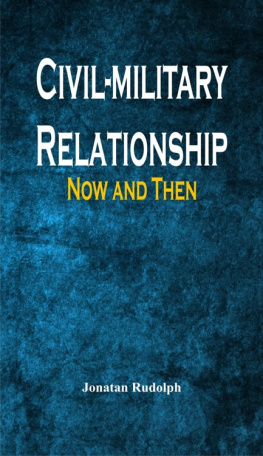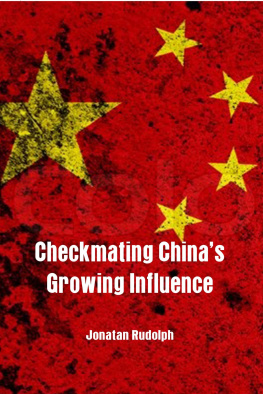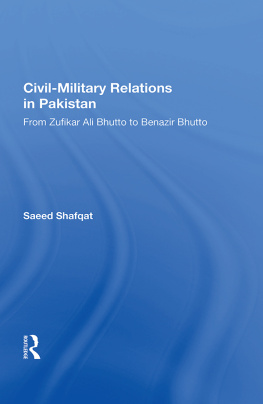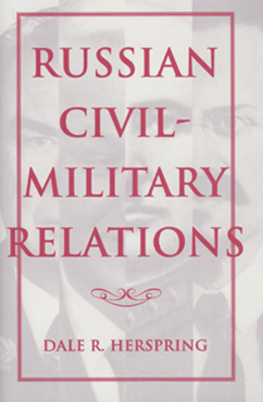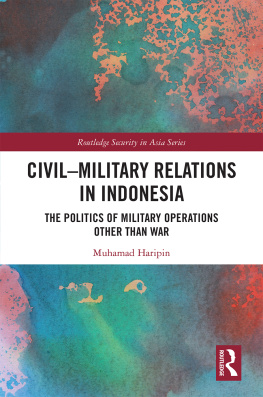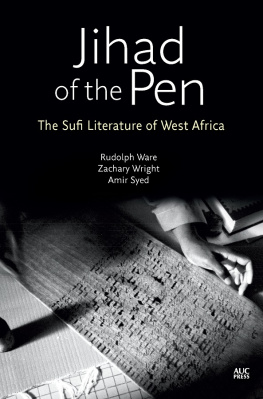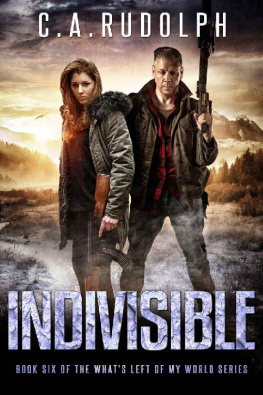Civil-military Relationship
Now and Then
Civil-military Relationship
Now and Then
Jonatan Rudolph
Alpha Editions
Copyright 2017
ISBN : 9789386367525
Design and Setting By
Alpha Editions
email - alphaedis@gmail.com
All rights reserved. No part of this publication may be reproduced, distributed, or transmitted in any form or by means, including photocopying, recording, or other electronic or mechanical methods, without the prior written permission of the publisher.
The views and characters expressed in the book are of the author and his/her imagination and do not represent the views of the Publisher.
Contents
Preface
1. Civilmilitary Relations
2. Use of Force and Civilmilitary Relations
3. Trends in Civil-Military Relations
4. Comparative Look at Civil-Military Relations
5. Civilian Control of the Military
6. Civil-Military Relations: A Peacebuilding Issue
7. Civil Military Relations in Nepal and India
8. Civil-Military Relations in Latin America
9. Civilian Supremacy or Military Domination
10. Civil-Military Relations in China
11. Civil-Military Coordination Practices
12. Humanitarian Principles and Civil Military Relation
13. Civilian and Military Structures in the Field of Defence
14. Civilian-military Relations in Consolidated Democracy
15. Civil-Military Cooperation
16. Syria: Civil-military Relations during Civil War
Bibliography
Index
Preface
Civilmilitary relations describes the relationship between civil society as a whole and the military organization or organizations established to protect it. More narrowly, it describes the relationship between the civil authority of a given society and its military authority. Studies of civil-military relations often rest on a normative assumption that civilian control of the military is preferable to military control of the state. The principal problem they examine, however, is empirical: to explain how civilian control over the military is established and maintained.
At the heart of civil-military relations is the problem of how a civilian government can control and remain safe from the military institution it created for its own protection. A military force that is strong enough to do what is asked of it must not also pose a danger to the controlling government. This poses the paradox that because we fear others we create an institution of violence to protect us, but then we fear the very institution we created for protection.
Civil-military relations are those interactions between the military and civilian actors that in some way relate to the power to make political decisions. Traditionally, the study of civil-military relations levitated around questions of who is master and who is servant in civil-military relations and who guards the guardians of the nation. In other words: the question of civilian control is at the heart of civil-military relations.
Even though in recent years, especially with the fall of the Berlin Wall, democratization processes in eastern Europe, the enlargement of the North Atlantic Treaty Organization (NATO) and the proliferation of peace-building missions and programs in so-called post-conflict societies, the concept of security sector governance or security sector reform has gained prominence in the academic and policy-oriented literature, civilian control remains the central issue in civil-military relations in emerging democracies. All the matter is just compiled and edited in nature. Taken from the various sources which are in public domain.
As the book addresses this crucial issue quite deftly, it is hoped that it would prove to be a source of great information for the reader.
Editor
Civilmilitary Relations
Introduction
Civilmilitary relations describes the relationship between civil society as a whole and the military organization or organizations established to protect it. More narrowly, it describes the relationship between the civil authority of a given society and its military authority. Studies of civil-military relations often rest on a normative assumption that civilian control of the military is preferable to military control of the state. The principal problem they examine, however, is empirical: to explain how civilian control over the military is established and maintained.
While generally not considered a separate academic area of study in and of itself, it involves scholars and practitioners from many fields and specialties. Apart from political science and sociology, Civ-Mil (CMR) draws upon such diverse fields as law, philosophy, area studies, psychology, cultural studies, anthropology, economics, history, diplomatic history, journalism, and the military, among others. It involves study and discussion of a diverse range of issues including but not limited to: civilian control of the military, military professionalism, war, civil-military operations, military institutions, and other related subjects. International in scope, civil-military relations involves discussion and research from across the world. The theoretical discussion can include non-state actors as well as more traditional nation-states. Other research involves discerning the details of military political attitudes, voting behaviour, and the potential impact on and interaction with democratic society as well as military families.
History
The history of civil-military relations can be traced to the writings of Sun Tzu and Carl von Clausewitz, both of whom argued that military organizations were primarily the servants of the state.
Concerns about a growing militarism in society, largely coming from the experiences of the first half of the twentieth century, engendered an examination into the impact of military organizations within society.
The ramifications of the Cold War, specifically the American decision to maintain a large standing army for the first time in its history, led to concerns about whether such a large military structure could be effectively maintained by a liberal democracy. Samuel P. Huntington and Morris Janowitz published the seminal books on the subject which effectively brought civil-military relations intoacademia, particularly in political science and sociology. Despite the peculiarly American impetus for Huntingtons and Janowitzs writing, their theoretical arguments are often used in the study of other national civil-military studies. However, in his book The Man on Horseback, Samuel E. Finer countered some of Huntingtons arguments and assumptions, and offered a look into the civil-military relationships in the under-developed world. Finer observed that many governments do not have the administrative skills to efficiently govern which may open opportunities for military interventionopportunities that are not as likely in more developed countries.
The increased incidence of military coups dtat since World War II, particularly in the 1960s and 1970s, brought about a growing interest in academic and journalistic circles in studying the nature of such coups. Political upheaval in Africa led to military take-overs in Dahomey, Togo, Congo, and Uganda, to mention just a few. Political unrest in South America, which involved military coups in Bolivia (189 military coups in its first 169 years of existence), Chile, Argentina, Brazil, Paraguay, Peru, and Uruguay, was largely a result of forces attempting to stem the increasing influence of left-wing and communist led uprisings. The 2006 military coup in Thailand engendered continued interest in this area.
The end of the Cold War led to new debate about to the proper role of the military in society, both in the United States and in the former Soviet Union. However, as before, much of the discussion revolved around whether the power of the state was in decline and whether an appropriate level of civilian control was being brought to bear on the military.

